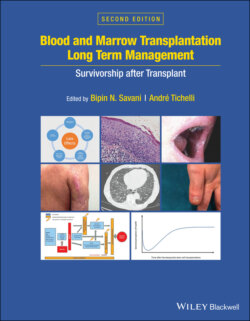Читать книгу Blood and Marrow Transplantation Long Term Management - Группа авторов - Страница 114
Quality of Life and Psychosocial Effects
ОглавлениеThough there are abundant studies on early health‐related quality of life (HRQoL) and psychosocial effects of auto‐transplant, data on long‐term HRQoL are scant in this population [55,56]. Common late psychosocial effects after AHSCT that have been described include distress, anxiety, and depression. In a study on HRQoL and psychosocial health in transplant survivors at a median of 7 years posttransplant, significantly inferior HRQoL was noted compared to healthy controls [57]. Approximately 60% of patients in this cohort were auto‐transplant survivors. HRQoL decrement was noted in several domains, including physical health, physical functioning, social functioning, psychological adjustment, and relationship adjustment [57]. Within the physical functioning domain, transplant survivors reported more sleep and sexual problems, higher fatigue, pain, and cognitive dysfunction. Furthermore, transplant survivors also reported more depressive symptoms, anxiety, poor mental health, and poor spiritual well‐being compared to controls [57]. Another prospective study on long‐term HRQoL after AHSCT showed stabilization of most domains at 3 years, except for role functioning and patient‐reported dyspnea, which had improved compared to baseline [58]. Notably, patients with a primary lymphoma diagnosis had a superior HRQoL at 3 years compared to those with MM [58], which is likely explained by the fact that patients with MM are not cured with transplant, and thus will eventually have progressive disease. Transplant‐related concerns or problems reported by more than one out of four survivors are fatigue, worsening overall condition, lack of sexual interest and satisfaction, changes in appearance, pain, retaining job, being able to work at home, and transplant being unsuccessful [59]. In patients with relapsed MM undergoing salvage auto‐transplant, patient‐reported global health status/QoL is significantly worse at day 100 compared to those undergoing non‐transplant consolidation. However, the QoL decrement in the transplant arm dissipates at 6‐month and beyond [60]. The incidence of depressive symptoms in long‐term transplant survivors ranges from 7–15% [59,61], however, granular data on depression in auto‐transplant survivors are lacking. Auto‐transplant survivors with three or more non‐malignant late effects have worse physical functioning, higher likelihood of moderate to severely limited usual activities, and lower likelihood of returning to full‐time work or study compared to those with two or less late effects [3]. Auto‐transplant survivors are also more likely to have difficulty maintaining a job due to health problems compared to their siblings, with the risk being 2.6‐fold higher in older survivors [8].
Patients should be clinically assessed for distress, anxiety, depression, and HRQoL during the transplant recovery period, at 6 months, 1 year, and annually thereafter, ideally in a dedicated survivorship clinic with dedicated social workers. Referral should be made to a mental health professional if clinically indicated [17]. Transplant survivors should also be queried about sexual functioning periodically and caregivers should be assessed for mental health, psychological, and relationship adjustment. Long‐term financial toxicity due to inability to retain jobs especially in high‐risk patients can be potentially addressed by social work or a financial navigator in the transplant clinic.
